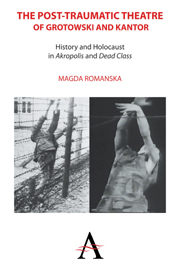 The Post-traumatic Theatre of Grotowski and Kantor
The Post-traumatic Theatre of Grotowski and Kantor Book contents
- Frontmatter
- Contents
- Foreword by Kathleen Cioffi
- Preface
- Acknowledgments
- List of Illustrations
- Introduction
- Part I Our Auschwitz: Grotowski's Akropolis
- Part II Our Memory: Kantor's Dead Class
- Chapter 22 Tadeusz Kantor: A Very Short Introduction
- Chapter 23 Dead Class: The Making of the Legend
- Chapter 24 Dead Class in Poland
- Chapter 25 The Polish History Lesson
- Chapter 26 Dead Class Abroad
- Chapter 27 On Not Knowing Polish, Again
- Chapter 28 The Visual and the Puerile
- Chapter 29 The National and the Transnational
- Chapter 30 Witkiewicz's Tumor
- Chapter 31 An Age of Genius: Bruno Schulz and the Return to Childhood
- Chapter 32 Conversing with Gombrowicz: The Dead, the Funny, the Sacred and the Profane
- Chapter 33 Panirony: “A pain with a smile and a shrug”
- Chapter 34 Raising the Dead
- Chapter 35 Dead Class as Kaddish…
- Chapter 36 Dead Class as Dybbuk, or the Absence
- Chapter 37 The Dead and the Marionettes
- Chapter 38 Men and Objects
- Chapter 39 Dead Class as Forefathers' Eve
- Chapter 40 Dead Class: The Afterlife
- Postscript
- Appendix
- Notes
- Bibliography
- Index
Chapter 31 - An Age of Genius: Bruno Schulz and the Return to Childhood
from Part II - Our Memory: Kantor's Dead Class
- Frontmatter
- Contents
- Foreword by Kathleen Cioffi
- Preface
- Acknowledgments
- List of Illustrations
- Introduction
- Part I Our Auschwitz: Grotowski's Akropolis
- Part II Our Memory: Kantor's Dead Class
- Chapter 22 Tadeusz Kantor: A Very Short Introduction
- Chapter 23 Dead Class: The Making of the Legend
- Chapter 24 Dead Class in Poland
- Chapter 25 The Polish History Lesson
- Chapter 26 Dead Class Abroad
- Chapter 27 On Not Knowing Polish, Again
- Chapter 28 The Visual and the Puerile
- Chapter 29 The National and the Transnational
- Chapter 30 Witkiewicz's Tumor
- Chapter 31 An Age of Genius: Bruno Schulz and the Return to Childhood
- Chapter 32 Conversing with Gombrowicz: The Dead, the Funny, the Sacred and the Profane
- Chapter 33 Panirony: “A pain with a smile and a shrug”
- Chapter 34 Raising the Dead
- Chapter 35 Dead Class as Kaddish…
- Chapter 36 Dead Class as Dybbuk, or the Absence
- Chapter 37 The Dead and the Marionettes
- Chapter 38 Men and Objects
- Chapter 39 Dead Class as Forefathers' Eve
- Chapter 40 Dead Class: The Afterlife
- Postscript
- Appendix
- Notes
- Bibliography
- Index
Summary
Kantor's second literary inspiration was Bruno Schulz, a Polish-Jewish writer of the interwar period, widely regarded as one of the most imaginative writers of his generation. His collection of short stories, Cinnamon Shops (published in English as The Street of Crocodiles), was first published in 1934 in Warsaw. A second collection, titled Sanatorium Under the Sign of the Hourglass, was published three years later, and included a series of illustrations that Schulz created especially for the book. A third collection, The Messiah, was lost during World War II. A collection of Schulz's personal letters, titled Book of Letters, has only recently been published. Born in 1892 in Drohobycz, a small, predominantly Jewish town located near Lvov, Schulz spent most of his life in his hometown, rarely leaving. He considered Drohobycz a microcosm of the modern world, a place where small and grand passions play out against the canvas of drudgery-filled, day-to-day existence. He drew his inspiration from the town's daily rhythms, proving himself to be an accurate observer of its life and inhabitants. During World War II, Schulz's visual talents earned him protection from a Gestapo officer, Felix Landau, who was stationed in Drohobych and who admired Schulz's drawings. Schulz was eventually shot by another Gestapo officer as payback for Schulz's protector shooting the officer's own “personal Jew,” a dentist. The bitter irony of Schulz's own death has never been lost; in fact, it has become a part of his legend, always present in the consciousness of those who come to admire his writing.
- Type
- Chapter
- Information
- The Post-traumatic Theatre of Grotowski and KantorHistory and Holocaust in 'Akropolis' and 'Dead Class', pp. 229 - 237Publisher: Anthem PressPrint publication year: 2012


